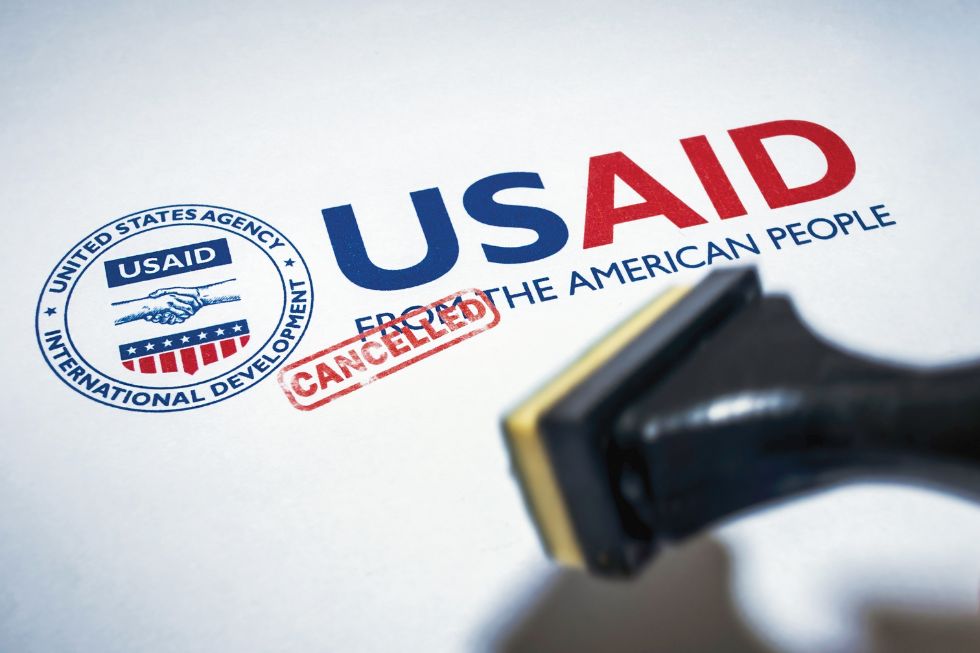Upon regaining his throne at the Oval Office in January, US President Donald Trump signed a much remarked executive order that “paused all U.S. foreign assistance funded by or through the State Department and U.S. Agency for International Development (USAID) for review.” Trump had already made it clear that the promised “review” was little more than a formality. The verdict had already been reached. It was time to shut down this pretext for shameless freeloading by ungrateful foreigners and woke information warriors.
The website Relief Web has raised the alarm: “The U.S. government’s decision to pause foreign aid for 90 days has already had dire consequences. Millions of children from war-torn countries depend on this support for basic essentials, education and mental health support. All of this and more is now at risk.” Trump, the self-proclaimed peace president, might have been tempted to cynically reply, concerning the “war-torn countries” victimized by his decision: “Well, that should teach them to stop waging war.”
The website Global Investigative Journalism Network (GUN) signals another victim of Trump’s assault on USAID. “Independent nonprofit media around the globe suddenly find themselves at the center of a perfect storm of at least four new existential threats.”
Today’s Weekly Devil’s Dictionary definition:
Independent nonprofit media :
- Non-commercial media that does not rely for its funding on a source that uses it to promote its interests.
- Non-commercial media that relies for its funding on a source that uses it in devious ways to promote its interests, which may even include the overthrow of democratically elected governments.
Contextual note
Aren’t these two definitions contradictory? Can a truth and its opposite be simultaneously true? In a world governed by logic, that should never be the case. But in the real world, when forces other than formal logic are at play, opposites can happily co-exist. One omnipresent feature of our current global social, economic and cultural world makes that possible: hard cash.
Whether we’re talking about politics or news media — thanks to the combined effects of the flexibility of language and the naturally acquisitive instincts of humans — money will always exert an influence equal if not superior to the informed reflection produced by moral agents gifted with the faculty of reason. Experience shows us that in the best of worlds there will always be a struggle between the two.
Most of us like to believe that, for the sake of social stability, politics and the news can somehow rise above the influence of money. Politics aims at equitable governance. News aims at building the awareness and discernment of an informed citizenry. People living in democracies, by instinct and education, spontaneously embrace these ideals. So why is the reality we live in so different?
No one today can fail to notice how the rise of narcissistic plutocrats and oligarchs has corrupted many of our institutions. In the United States, parties and candidates routinely spend billions of dollars in their quest to be elected. They use whatever available means exist to achieve their goals. Just in the past week in France, a leading presidential candidate, Marine Le Pen and a former president, Nicolas Sarkozy, have been disqualified from running for office on the grounds of illicit campaign financing.
Some deem this normal, even the rules of the game. Money is power and it seeks power. Power relies on money. Media, on the other hand, can theoretically exist according to different principles. Two of those principles are the ones cited by GUN: independence and nonprofit status. To the extent to which commercial media obeys the ironclad laws of “shareholder interest,” we should never be surprised to see money trump the desire for transparency. We expect independent nonprofit media to play by a different set of rules.
Full disclosure: Fair Observer is both independent and nonprofit, in the strictest sense of those words. We live in a virtual garret. We open the doors of our humble abode to the widest variety of points of view. We have no advertising. Our donors are all individuals who appear to appreciate what we’re doing. Some of them express their distaste for some of the columns we publish (for example, my own), but because no one who writes for us seeks a profit or even employment, they know we are committed to the democratic ideals our society theoretically embraces.
The term “independent nonprofit media” contains two adjectives. Each has a straightforward meaning. But the term “nonprofit” can contain a dangerous ambiguity. The sound of the word appears to signal that money plays no significant role in its operations. But let’s stop kidding ourselves. Money always plays a role, and to the extent it does, it may compromise the notion of independence. A glance at the history of USAID’s support for media across the globe reveals this reality.
Historical note
The budget figure cited in GUN’s article offers a clue to the relativity of the notion of independence as a guideline for USAID’s activity. “The sudden hold on USAID foreign assistance funding by the US Trump administration has frozen an estimated $268 million in agreed grants for independent media and the free flow of information in more than 30 countries, including several under repressive regimes — and much more lost for the future — throwing much of the nonprofit watchdog sector into crisis, and potentially leaving numerous reporters, contractors, and accountability projects without pay in the weeks ahead.”
The sentiment is widely shared in the liberal West. A recent headline in The Guardian features one of the paper’s favorite journalistic methods — scare tactics — always useful when attacking politicians it doesn’t approve of, such as Trump or Jeremy Corbyn. “Trump’s aid cuts will lead to a surge in propaganda and misinformation, say press freedom groups.” The subtitle reads: “From Ukraine to Afghanistan, independent media organisations across the world are being forced to lay off staff or shut down after losing USAid funding.” It cites the same figure and even ups the ante slightly when it evokes “projects supported by USAid, including more than $268m (£216m) allocated to support ‘independent media and the free flow of information’.”
Even if spread out across the globe, $268 million is a significant sum emanating from a single source. USAID is known for its commitment to strategic goals defined in 1961, at the height of the Cold War. The emphasis may have been on nonprofit, but it would be embarrassingly naïve to believe it was all about independence.
Have USAID’s goals changed since 1961? El Salvador’s President Nayib Bukele recently complained of what he characterizes as the central mission of the agency: destabilizing countries that don’t align with its values. “It’s clear there is no opposition without USAID money.” On February 2, he posted this message on X: “Most governments don’t want USAID funds flowing into their countries because they understand where much of that money actually ends up. While marketed as support for development, democracy, and human rights, the majority of these funds are funneled into opposition groups, NGOs with political agendas, and destabilizing movements.”
Trump is conducting a no-holds-barred assault on the US Constitution. That hasn’t stopped Trump’s Vice President JD Vance, unconcerned by that issue, from denouncing very real violations of the principles of democracy in Europe: a cancelled election in Romania, repressive measures in Germany and elsewhere, to say nothing of French President Emmanuel Macron’s utter contempt for the results of the same democratic elections he himself provoked. In the background, we’re witnessing a wave of enthusiasm for war with Russia in preference to diplomacy and even complicity of leading democracies in Israel’s flagrant genocide.
The world is in dire need of true independent and nonprofit media to report and analyze the news, which means conveying a diversity of views and interpretations. At Fair Observer, we’re doing our bit, while respecting all the rules of true independence. Neither USAID nor George Soros (known for accompanying USAID) has offered to help us. That is why we count on the rest of you, and not USAID, to ensure our survival.
*[In the age of Oscar Wilde and Mark Twain, another American wit, the journalist Ambrose Bierce produced a series of satirical definitions of commonly used terms, throwing light on their hidden meanings in real discourse. Bierce eventually collected and published them as a book, The Devil’s Dictionary, in 1911. We have shamelessly appropriated his title in the interest of continuing his wholesome pedagogical effort to enlighten generations of readers of the news. Read more of Fair Observer Devil’s Dictionary.]
[Lee Thompson-Kolar edited this piece.]
The views expressed in this article are the author’s own and do not necessarily reflect Fair Observer’s editorial policy.
Support Fair Observer
We rely on your support for our independence, diversity and quality.
For more than 10 years, Fair Observer has been free, fair and independent. No billionaire owns us, no advertisers control us. We are a reader-supported nonprofit. Unlike many other publications, we keep our content free for readers regardless of where they live or whether they can afford to pay. We have no paywalls and no ads.
In the post-truth era of fake news, echo chambers and filter bubbles, we publish a plurality of perspectives from around the world. Anyone can publish with us, but everyone goes through a rigorous editorial process. So, you get fact-checked, well-reasoned content instead of noise.
We publish 2,500+ voices from 90+ countries. We also conduct education and training programs
on subjects ranging from digital media and journalism to writing and critical thinking. This
doesn’t come cheap. Servers, editors, trainers and web developers cost
money.
Please consider supporting us on a regular basis as a recurring donor or a
sustaining member.
Will you support FO’s journalism?
We rely on your support for our independence, diversity and quality.










Comment